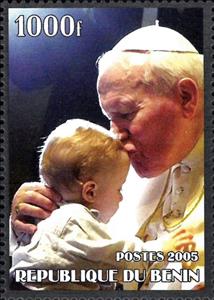Stamp: Farewell Pope John Paul II (Benin- Illegal Stamps 2005)
Farewell Pope John Paul II (Benin- Illegal Stamps 2005)
01 January (Benin- Illegal Stamps ) within release Benin goes into circulation Stamp Farewell Pope John Paul II face value 1,000 West African CFA franc
| Stamp Farewell Pope John Paul II in catalogues | |
|---|---|
| Colnect codes: | Col: BJ 2005-26/1 |
Stamp is square format.
This item was illegally produced without the authorization of the postal administration inscribed on the stamps. They have no postal validity. Stamp from souvenir sheet.Stamp Farewell Pope John Paul II it reflects the thematic directions:
Biologically, a child (plural: children) is a human being between the stages of birth and puberty. The legal definition of child generally refers to a minor, otherwise known as a person younger than the age of majority. Child may also describe a relationship with a parent (such as sons and daughters of any age) or, metaphorically, an authority figure, or signify group membership in a clan, tribe, or religion; it can also signify being strongly affected by a specific time, place, or circumstance, as in "a child of nature" or "a child of the Sixties". There are many social issues that affect children, such as childhood education, bullying, child poverty, dysfunctional families, child labor, hunger, and child homelessness. Children can be raised by parents, by fosterers, guardians or partially raised in a day care center.
A coat of arms is an heraldic visual design on an escutcheon (i.e. shield), surcoat, or tabard. The coat of arms on an escutcheon forms the central element of the full heraldic achievement which in its whole consists of shield, supporters, crest, and motto. A coat of arms is traditionally unique to an individual person, family (except in the United Kingdom), state, organisation or corporation.
The pope (Latin: papa, from Ancient Greek: πάππας, romanized: páppas, lit. 'father') is the bishop of Rome and the visible head[a] of the worldwide Catholic Church. He is also known as the supreme pontiff, Roman pontiff, or sovereign pontiff. From the eighth century until 1870, the pope was the sovereign or head of state of the Papal States, and since 1929 of the much smaller Vatican City state.From a Catholic viewpoint, the primacy of the bishop of Rome is largely derived from his role as the apostolic successor to Saint Peter, to whom primacy was conferred by Jesus, who gave Peter the Keys of Heaven and the powers of "binding and loosing", naming him as the "rock" upon which the Church would be built. The reigning pope is Francis, who was elected on 13 March 2013.
Religion is any cultural system of designated behaviors and practices, world views, texts, sanctified places, ethics, or organizations, that relate humanity to the supernatural or transcendental. Religions relate humanity to what anthropologist Clifford Geertz has referred to as a cosmic "order of existence". Different religions may or may not contain various elements ranging from the "divine", "sacred things", "faith", a "supernatural being or supernatural beings" or "some sort of ultimacy and transcendence that will provide norms and power for the rest of life". Religious practices may include rituals, sermons, commemoration or veneration (of deities), sacrifices, festivals, feasts, trances, initiations, funerary services, matrimonial services, meditation, prayer, music, art, dance, public service, or other aspects of human culture. Religions have sacred histories and narratives, which may be preserved in sacred scriptures, and symbols and holy places, that aim mostly to give a meaning to life. Religions may contain symbolic stories, which are sometimes said by followers to be true, that have the side purpose of explaining the origin of life, the Universe and other things. Traditionally, faith, in addition to reason, has been considered a source of religious beliefs. There are an estimated 10,000 distinct religions worldwide. About 84% of the world's population is affiliated with one of the five largest religions, namely Christianity, Islam, Hinduism, Buddhism or forms of folk religion.



